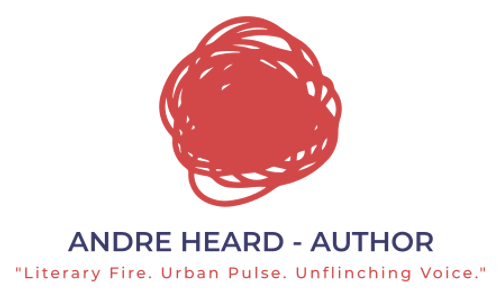Unlocking the Journey: My Thrilling Adventure in Writing Dead Code Republic Code Black
- andreheard69
- Aug 18, 2025
- 5 min read
Writing a novel really is a journey—and mine was a wild one.
Dead Code Republic: Code Black, my first published novel, dragged me through a maze of creativity, self-doubt, and breakthrough moments. In this post, I’m pulling back the curtain to share what it took to finish the book—the challenges, the wins, and the lessons that came with it. If you’re thinking about writing your own, maybe this will give you the push to start.
The Spark of Inspiration
Every story starts with a moment. For Dead Code Republic: Code Black, that moment hit the weekend after Thanksgiving 2024, when I heard President Donald Trump deliver a bizarre message to the so-called "Radical Left Lunatics"—aka the Democrats. It was surreal, and it made one thing clear: we were heading into strange times.
That speech lit the fuse. I started imagining a near-future dystopia where technology runs wild, civil liberties crumble, and no one trusts the government. The phrase code black—a term used for emergencies—clicked instantly. It captured the chaos I saw brewing in real life, and the kind I wanted to explore in fiction.
That seed of an idea grew fast. I logged more than 100 hours building the world—crafting characters, mapping settings, pushing the boundaries of what felt possible. I wanted something that felt both familiar and foreign, a place where readers could lose themselves while asking tough questions about the future we're racing toward.
Crafting the Characters
The heart of Dead Code Republic: Code Black is its characters. Writing them wasn’t just fun—it was essential. Each one had to carry emotional weight, moral complexity, and a piece of the world’s unraveling future.
Elias is the anchor—a man with a sharp mind and a fractured sense of loyalty, constantly torn between duty and survival. He’s not your typical hero. He’s calculating, haunted, and forced to operate in shades of grey. His choices drive the story, but his ghosts shape it.
Dante, his closest ally, brings the fire. A former soldier with scars that run deeper than the skin, Dante is both a fighter and a philosopher—wrestling with what freedom really means in a world wired for control. His dynamic with Elias pushes both men to the edge.
Cass is the wildcard—brilliant, unpredictable, and dangerous in ways most people miss. She’s not interested in playing by anyone’s rules, and that’s exactly what makes her a threat—and a necessity.
Then there’s Valerie Dawson, the face of power. She’s polished, persuasive, and utterly ruthless. As the public face of a collapsing regime, she’s not just part of the system—she is the system. And she’ll do whatever it takes to hold it together.
And behind the curtain? The Russians. Not caricatures, but power players with their own agendas—operatives and oligarchs who know how to exploit chaos and aren't afraid to accelerate it.
These characters aren’t just players in the plot—they’re the reason the story hits hard. Every betrayal, every alliance, every moment of doubt or violence ripples outward because of them.
The Writing Process
Writing a novel isn’t romantic—it’s a grind. Early on, I realized discipline mattered more than inspiration. I set a hard goal: 1,000 words a day. No excuses. Even when the words came slow, I showed up.
Quiet, distraction-free spaces became my sanctuary. On the best days, I’d slip into the world I was building and lose track of time. Routine became everything. Studies say it can boost productivity by 30%—I didn’t need the stat; I lived it.
But it wasn’t smooth sailing. Some days, the doubt hit hard. Was the story working? Were the stakes high enough? Was I wasting time? At one point, I scrapped entire chapters to fix pacing and tighten the plot. It hurt—but the rewrite made the book better. That’s the thing about writing: the hard parts are the process.
The Editing Journey
Finishing the first draft felt like a victory—until I started editing. That’s when the real battle began. Revision tests your patience, your ego, and your ability to kill your darlings. I spent weeks slashing scenes that didn’t move the plot and tightening dialogue to make it hit with more honesty and edge.
Beta readers were a game-changer. Their feedback didn’t just point out weak spots—it gave me fresh eyes on my own world. One big breakthrough came after revisiting the first three chapters. I rewrote them based on early reactions, and reader engagement jumped by 20%.
Editing taught me something crucial: you have to let go. Your words aren’t sacred. The story comes first—and sometimes, that means tearing it apart to build something better.
The Self-Publishing Decision
Once the revisions were done, I hit a crossroads: go the traditional route, or take control and self-publish. Traditional publishing comes with perks—marketing muscle, broader distribution—but also long wait times and less creative freedom. I didn’t want to compromise my vision or wait years for a gatekeeper’s green light.
Self-publishing gave me full control—over the story, the timeline, and the reader experience. Dead Code Republic: Code Black wasn’t just a novel; it was a world I built, and I wanted that world to reach readers without dilution.
I did my homework. After researching different platforms, I chose one that matched my goals: direct access to readers who love tech thrillers and dystopian fiction. I handled the formatting myself and oversaw the cover design—both demanding but worth it. In the process, I picked up skills I never expected to learn, from layout design to digital publishing logistics.
Marketing My Novel
Marketing the book was a whole new battlefield. Writing it was one thing—getting people to read it was another. I quickly realized that promotion takes just as much hustle as the writing itself.
I built an author website to anchor my online presence and started connecting with readers on platforms like Goodreads. Social media wasn’t just optional—it was essential. Stats say authors with an online presence can sell up to 60% more books. I didn’t want to leave that on the table.
Some strategies worked, others flopped—but every move taught me something. Marketing isn’t about shouting into the void. It’s about finding your people and giving them a reason to care.
I reached out to book bloggers and reviewers, generating significant buzz around the release. The response was overwhelmingly positive, and it was gratifying to see readers connecting with my story. One review highlighted how the themes of technology's impact resonated with their experiences, validating the hard work I had put in.
Lessons Learned
Reflecting on my journey, I've gathered several key lessons that I want to share with aspiring writers:
Stay Committed: Writing a novel is a marathon, not a sprint. Set realistic goals, like daily word counts, and remain dedicated to your vision.
Embrace Feedback: Constructive criticism is invaluable. It helps you improve your work and grow as a writer.
Celebrate Small Wins: Every milestone, whether it’s finishing a chapter or receiving positive feedback, is worth celebrating.
Keep Learning: The writing and publishing landscape is always changing. Stay curious and open to new ideas.
Enjoy the Process: Writing should be a joyful experience. Embrace the ups and downs, and remember why you began this journey in the first place.
Reflecting on My Writing Adventure
Publishing Dead Code Republic: Code Black has been an incredible adventure filled with challenges, growth, and triumph. I hope that by sharing my journey, I can inspire others to embark on their own writing paths.
Whether you're a seasoned writer or just starting, every story is worth telling. Embrace your unique voice, and don't hesitate to share it with the world. The road may be daunting, but the rewards are immeasurable.





Comments